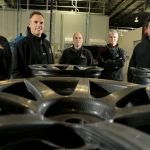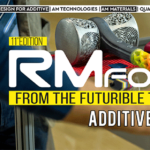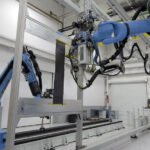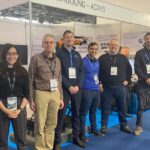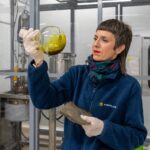The Clean Energy Finance Corporation has tipped $10 million into a Geelong-based firm that makes the lightweight carbon fibre wheels that feature as an option on the breathtaking $600,000 Ford GT supercar.
The government green bank’s contribution seals a $50 million capital raising for Carbon Revolution, the only company in the world to master mass production of carbon fibre wheels. It will use the money to automate its plant and expand capacity from 6000 wheels a year to more than 100,000 by 2021.
That will help cut costs and make Carbon Revolution’s unique wheels – also a fixture on Ford Motor Company’s top-of-the-range Mustang Shelby GT350R – viable for cheaper, high-volume cars.
Blair Pritchard, director of the CEFC’s Clean Energy Innovation Fund, compared the potential of Carbon Revolution’s wheels to Australia’s greatest high tech successes – the Cochlear ear implant and Wi-Fi – saying he hoped carbon fibre wheels would be as “transformative”.
Chief executive Jake Dingle said Carbon Revolution would use the money to drive its wheels and manufacturing processes to the next level of performance and scale, and to fund its entry into the aircraft wheels market.
“This is a very exciting phase for the company and one that will see us cement our global leadership position,” Mr Dingle said. Carbon Revolution is planning a public float in about two years.
Lightweight
For the CEFC, carbon fibre wheels offer huge savings in weight, fuel usage and carbon emissions, justifying the agency’s investment in a high tech automotive manufacturing business that sits outside its typical universe of clients.
Carbon fibre wheels are up to 45 per cent lighter than aluminium wheels, which are on half of today’s light vehicles. Making carbon fibre also uses much less energy than making aluminium. The wheels can reduce carbon emissions by 6 per cent when fully integrated into a vehicle’s design – a huge saving on the 10 per cent of total emissions generated by light vehicles.
By reducing a vehicle’s “unsprung” – below suspension – weight they boost performance. Carbon Revolution started selling its high-priced wheels as an after-market accessory for Audis, BMWs and other high-performance cars.
It signed its first “original equipment manufacturer” (OEM) deal with Ford for the $US63,000 ($85,000) Mustang Shelby 350GTR in 2015 and followed up with the Ford GT in May.
Aircraft
As well as eyeing other performance car makes, the company has its eye on the much larger markets of mass produced vehicles, aircraft and eventually trucks – where fuel efficiency is top priority. Total light vehicle wheel sales are 420 million globally, growing at 4 per cent annually.
Mr Dingle said Carbon Revolution was producing prototype aircraft wheels under a partnership with a tier one supplier to aircraft manufacturers. “That’s our next horizon,” he said.
The company will tackle truck and commercial vehicle wheels – where cost is key – once it has its advanced automation in place.
Existing shareholders including Switzerland’s Ronal AG, the largest aluminium wheel maker in Europe, Deakin University and small cap fund manager Acorn Capital also supported the raising, which was managed by stockbroker Evans and Partners.
Caption Figure Nr.1
Carbon Revolution executives, from left, chairman James Douglas, CEO Jake Dingle, CFO Nick Batchelor, manufacturing director Greg Lindsay and engineering and design director Ashley Denmead have plenty to be excited about. Pat Scala
Caption Figure Nr.2
Ford senior executive Raj Nair proudly shows off a $600,000 Ford GT supercar, which runs on Geelong firm Carbon Revolution’s carbon fibre lightweight wheels. Supplied/Sam VarnHagen



